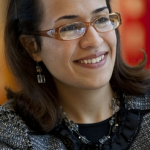From engineering to public policy: Maliheh’s story
Today I’m introducing the second student who is participating in the Student Stories feature in the blog. Maliheh Birjandi Feriz is a second-year student pursuing Development Economics and International Environment and Resource Policy as her Fields of Study. Like Mirza, who told his story a few weeks ago, I asked Maliheh to contribute to this blog feature simply because I’ve enjoyed getting to know her. I hope blog readers will find her story interesting.
 When I first applied to Fletcher, I didn’t know how it would change the path of my career. I knew my background had many valuable elements, but I hadn’t found a way to fit the pieces together.
When I first applied to Fletcher, I didn’t know how it would change the path of my career. I knew my background had many valuable elements, but I hadn’t found a way to fit the pieces together.
I received dual Bachelor’s Degrees in Industrial Engineering and Petroleum Engineering from the Sharif University of Technology (known as the MIT of Iran), and a Master of Business Administration from the same university. One of the best things about an engineering career is the wide range of projects you can work on. I’ve done everything from computer programming to simulate an oil reservoir, to a system-dynamics analysis exploring the impacts of deforestation on household income. Although it might sound unrelated, the analytical skills I acquired in engineering came into play as important factors in explaining my success in business. Through my experience working on practical projects, I learned that engineers who turn into organization managers and leaders need not completely give up their technical creativities; a high ranking manager can also be a technology expert, and in fact, this combination of expertise is well suited to the rapid pace of innovation and global competition. As an entrepreneur, I launched my own management consulting firm, and tried to sell multidisciplinary services in a market that was then blind to environmental values, and also ignorant of young women entrepreneurs, which brought me enormous cultural challenges.
Through running my own business and face-to-face conversations with senior-level managers, I became aware of my then very local perspective on environmental systems, without a clear connection to the broader regional and global efforts. However, finding a graduate program in which I could enhance my knowledge of global environmental issues, and at the same time interact with people who can see both sides of this interdisciplinary spectrum, was not an easy task.
This was my motivation for applying to the Fletcher School. I came to Fletcher intending to leverage my experience on environmental policy-related issues and reorient it through an international lens, but I found that my coursework had an even more profound impact. In my previous degree programs, disciplines were kept strictly separate. At Fletcher, I found that the pieces fit neatly together through an interdisciplinary approach. With an opportunity to select classes from several disciplines simultaneously, I was able to uncover my own competitive advantage, which will shape my career for the rest of my life. Moreover, I have taken advantage of this multidisciplinary environment in different ways to sharpen my skills in research, leadership, teaching, writing, and communicating with others.
At Fletcher, I found people were genuinely interested in different cultures. To declare oneself as Iranian was not an unusual thing. From my first visit to The Fletcher School, and seeing the flags of all countries (including Iran’s) around the Hall of Flags, I realized that it is safe here to say, “I am an Iranian.” Not only did I feel completely comfortable with my classmates, but here I was also exposed to a very diverse environment.
Now I am in my second year at Fletcher. I spent last summer as a consultant at the World Bank, and I am preparing applications to PhD programs. Although only a little more than a year has passed since I first enrolled at Fletcher, I feel like I’ve gained ten years worth of perspective on how my academic and professional experience will fit together in the future. I don’t think I could have gained this perspective in any other way.